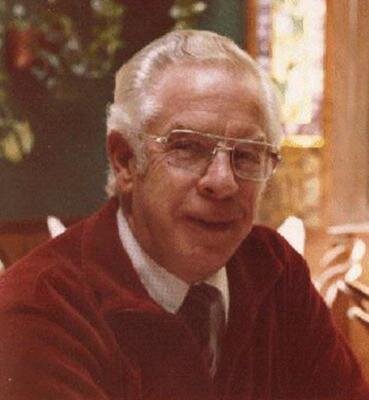
Conrad W. Baars, MD
Early Life
Conrad (“Koert”) W. Baars, M.D. (1919-1981), Catholic psychiatrist, author and lecturer, was born in Rotterdam, the Netherlands, on January 2, 1919. He was born into a prominent family, the second of six children. Koert wrote in his autobiography, Doctor of the Heart how, from very early in life, he had a zeal for knowledge and a great love for books. He was well educated in the liberal arts as were most Dutch students, and was always one to take on a challenge. Koert spoke also of his great faith in God and his strong religious background, and explained how these attributes, his temperament, and especially his faith led him through many difficult times—especially during World War II.Koert originally started out studying chemical engineering, but soon came to realize that his real desire was to study medicine. In the years before World War II, Koert attended medical school at the University of Amsterdam. Simultaneously, he joined the Royal Dutch Army because of the dangerous situation brewing in Europe. He also put his name on the list of quotas to emigrate to the United States. He admired the freedom that America offered, and eagerly anticipated the day when he could emigrate to the land that promised him the desire of his heart—the United States.World War II
It was during the time of Koert’s medical studies at the University of Amsterdam that the Nazis bombed the city of Rotterdam. No longer could the Dutch remain neutral in this war, and Koert himself was forced to flee the Netherlands.To fight the Nazis, Koert joined the French underground resistance. He fought the enemy alone or in partnership with one or two others at any given time. He thought joining the larger Dutch Underground would be too dangerous, as these people were easier for the Nazis to identify and arrest. Koert lived under assumed names with falsified papers in order to do whatever he could to undermine the Nazi occupiers.His life was one of constant peril during that time, and the time came when he and his two comrades realized that they were close to detection by the Nazis. It was time then for them to escape to Spain yet, during their flight over the Pyrenees Mountains the rain at the base of the mountain turned into snow that covered the path and ultimately the route to freedom. What should have been a ten-hour climb on the first night, and an eight-hour climb on the last night, turned into a nightmare. They were so close to freedom, yet so far away. In horrendous conditions, without proper clothing or food, the group got lost. They were captured by the Gestapo after many hours of nearly impossible mountain climbing, and the death of one member of the expedition.Buchenwald Concentration Camp
The Gestapo arrested the group and transferred them to prison. After interrogation, Koert was sent to a concentration camp north of Paris, and was finally transferred to the notorious Buchenwald concentration camp in Germany in the winter of 1943.Koert entered the camp as prisoner number 38263. Most of the people he met there did not make it out of the camp alive. Koert saw firsthand the horrible atrocities about which he had previously only heard stories. The living conditions at the camp were inhumane by any standard and the treatment of the prisoners barbarous. Because he was a medical student, Koert was advised by a fellow prisoner to tell the Gestapo that he was a doctor, and he was put in the position of nursing the sick. This turned out to be an enviable position in the camp and a blessing for him, because he was given slightly better living conditions and a bit better food than much of the rest of the camp. Despite this slight advantage, by the day of liberation 19 months later, malnutrition had cost him several of his teeth as well as his health, as for the rest of his life Koert suffered from a weakened heart.Koert personally witnessed atrocities and murders in Buchenwald that stimulated him to fight against this evil with all the strength that he had. He credited his deep faith and reliance on God, as well as his anger at and fierce determination to fight against this evil oppression, as the major factors in his emerging from Buchenwald alive. Koert was to spend almost two years at this dreaded camp before liberation by the Americans came on April 11, 1945, a day he would always celebrate. Thousands were starved, tortured and murdered in this camp, before freedom came to the remaining twenty-one thousand prisoners.Koert learned through his experience there that the Nazi plan was to murder all of the prisoners and destroy all of the evidence of the camps. This experience left an indelible mark on his life and spirit and it was from this experience that he learned the most important truth: that only God gives life its meaning and purpose. Without God, life is meaningless.Emigration to the United States
After the war, Koert came to the United States on a student visa in 1946 after finishing his medical degree in the Netherlands in 1945. He toured a number of states and ended up as an intern in a Mount Vernon, New York hospital. After completion of his internship, he went from there to a residency in Chicago, Illinois. It was during this time that he met his future bride, Mary Jean Kennedy. Because of his marriage to an American citizen, he was able to apply for citizenship to the country in which he had longed to live. On January 15, 1951, Conrad W. Baars became an American citizen.After passing the appropriate examinations with excellence, Dr. Baars obtained a residency in psychiatry at Minneapolis General Hospital in Minnesota. After completing the residency, he joined the staff of the Rochester (Minnesota) State Hospital. During the years that followed, Koert became disillusioned with traditional methods of psychotherapy and he considered leaving the practice of psychiatry. “The psychoanalytic method which I had been taught in medical school did not seem to help many of those with whom I dealt” (Doctor of the Heart, p.206).Anna A. Terruwe, MD
It was at this time of professional crisis that Koert believed the Lord intervened and introduced him to the work of a Dutch psychiatrist, Dr. Anna Terruwe. Her revolutionary ideas of psychotherapy and the healing of the whole person, including the human person’s spiritual dimension, had a profound influence on Koert and reawakened his enthusiasm for psychiatry. It eventually led to his collaboration with her and together they developed a new method of psychotherapy based on the psychology of St. Thomas Aquinas.Dr. Baars spent the remainder of his life deepening his knowledge of the nature of man about which Aquinas spoke. He studied man’s life as it relates to emotional and spiritual health and well-being, and spread the knowledge that he had gained to the world. He spoke to the psychiatric world as well as the Christian world that he most tried to serve. In addition to his private practice in San Antonio, he lectured around the country and tried to reach out especially to those he believed had the greatest opportunity to help others understand what he had learned, to further disseminate this knowledge. Koert believed that the greatest problem in modern psychology was that it failed to integrate the spiritual dimension of man into the understanding of the human person’s emotional well-being. Conrad Baars, M.D. died on October 18, 1981.Legacy Continues
His legacy still continues in his work that is still being spread throughout the world through his books and CDs. A number of his books have recently been revised and republished. His daughter, Suzanne Baars, a psychotherapist in her own right, continues his work through her practice in Irving, Texas, conferences and numerous appearances on EWTN (Eternal Word Television Network). In addition, her audio lecture series Made In His Image and The Abode of Love: Developing the Heart, as well as other single talks, are available on CD.Epilogue
Dr. Baars’ life was about leading people to emotional and spiritual health and happiness. In the epilogue of Doctor of the Heart (p.226), Koert’s wife, Mary Jean, wrote about the central idea of her husband’s work: “unless and until we turn back to a God-centered world, we are not likely to produce cures in psychiatry and psychology which bring normalcy, happiness and peace to people.”A Tribute to Koert Baars:
Dr. Conrad W. Baars was a man with a vision—a man in a constant search for the truth. He was a Christian psychiatrist with a drive to expand his knowledge to know and understand as much as he could about human nature, man’s psyche, and the healing of emotional illnesses. He spent a large part of his life trying to find ever-deeper truths about God and humanity, and to further his understanding about them. He set about trying to help the world to heal—one person at a time.His understanding about the human person’s innate need for love and affirmation has tremendous potential for the counseling and psychological communities—both for clients and for therapists. I pray that his work will be furthered and all will come to know the love, understanding, and affirmation that he wanted all people to have, that they in turn love, understand, and affirm others.It is through the process of receiving genuine love and affirmation that people can then go on to have the happiness and joy in life that they long for. I believe that Conrad Baars took to heart and endeavored to fulfill the command in scripture to “strengthen your brothers” (Luke 22:32) as he commented on this in numerous lectures that he gave. He interpreted the word “strengthen” to be “affirmation” and he endeavored to follow the “perfect representation of an affirmed and affirming person”—Jesus Christ.— Bonnie N. Shayne, December, 1998
1. Baars, Conrad W. Doctor of the Heart. Staten Island, NY: Alba House, 1996.
2. Baars, Conrad W. Feeling and Healing Your Emotions. Rev. ed. Suzanne M. Baars and Bonnie N. Shayne (eds.) Plainfield, NJ: Logos International 1979. Gainesville, FL: Bridge-Logos, 2003.
